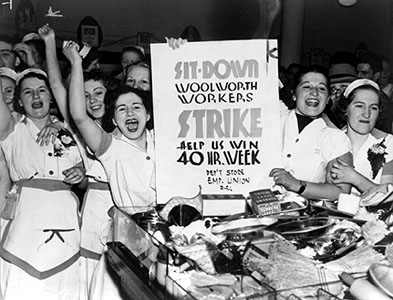
Today in women’s history, March 18, 1937, New York City police evicted and arrested striking Woolworth’s store clerks – mostly women – who had occupied stores demanding a 40-hour workweek. Police were met with huge protests at both the stores and the precinct where the workers had been taken. Once freed, the women returned to the store and re-occupied it. More arrests and protests ensued. Faced with such a massive movement, New York Mayor Fiorello LaGuardia intervened and forced Woolworth’s to offer a one-year union contract, an eight-hour day, six-day workweek and 32.5 cent per hour minimum wage.
The New York City clerks went on strike after 100 Detroit women workers had begun a sit-down strike at Woolworth’s there. Inspired by the Akron, Ohio, rubber workers and Flint, Mich., autoworkers that first used the sit-down strike as a tactic, retail clerks at Woolworth’s and other stores – first in Detroit and then New York City – did the same. The strike wave spread to other chain stores, led by the mostly female workforce, to smaller towns and big cities alike, including Providence, R.I., East St. Louis, Illinois, Superior, Wisc., St. Paul, Minn., Centralia, Wash., San Francisco and Seattle.
New York-based band Apocalypse Five and Dime created a musical about the strike. You can view the band’s performance here.
Photo: (Library of Congress, New York World-Telegram and Sun Collection)












Comments